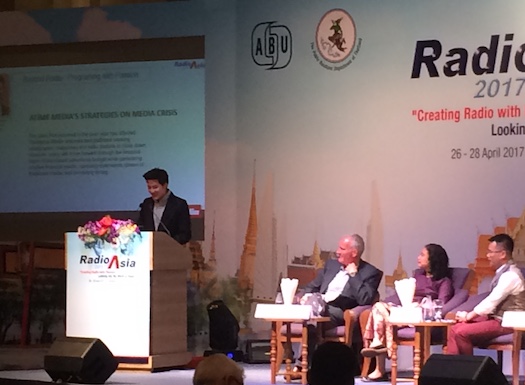On the second day of RadioAsia 2017 in Thailand, a range of speakers shared their experience of successful programming with delegates.
Puwanart Kunpalin (pictured) is a senior DJ with Airtime Media Thailand, the operator of some of the biggest commercial radio stations in Thailand.
He discussed the success of the radio group at today’s Radio Asia Conference in Bangkok.
“After the crisis of a few years ago, we have managed to survive and do well. We have learnt from experience… These are some of the crucial factors that are keys to success.
Kunpalin explained that one of the most important keys to success is to understand the ever changing needs and habits of the audience.
“We need to reach them as easily as possible, the smartphone is the key to this. We don’t see smartphones as a threat, we see them as a way to overcome limitations.”
All the company’s stations stream and are on various radio apps, plus they have their own apps, which is approaching 5 million downloads. There are multiple fan pages on social media.
Green Wave is the company’s most successful station and the longest running station in Thailand. “It is one of then most influential stations in the market. It plays good songs and creates good feelings,” he said. “It creates high loyalty in listeners, they stick with us.”
“We consider the audience as friends and family. We want them to see us a good family members… we do a range of activities for charity and collaborate with many community groups… we are have to maximise profit of course, but we are also showing that we are giving something back to society… It creates a positive energy.”
In another session Wilson Ching from RTHK Hong Kong explained the success of a new initiative.
Community Broadcasting in Hong Kong has been expanded through a new platform on RTHK, which gives community groups airtime.
Ching described the initiative, telling the delegates it has brought new passion for radio by producing programs for and with disadvantaged and underrepresented community groups.
“We become partners with these groups, and they bring new passion to our teams. Our objective is to get close to the community and get them more involved with broadcasting.”
Edna Bernabe from Philippines Polytechnic University told delegates that radio was established in Manilla in 1922, and the development of radio has been influenced by Japan and the US.
The FM band is mainly CHR music formats, while the AM band has more serious formats on air. Campus radio is also very strong in Philippines.
Radu Obreja spoke about one of the world’s largest digital radio deployments underway in India.
There are 39 transmitters in total in India, with 35 so far on air. There has been an investment of over 3 billion Indian Rupees in the project so far. The roll out in India covers 600 million people.
Currently it is in the fine tuning stage, to analyse the technical quality, sound quality and determine the most popular features that the audience wants.
Speaking about the availability of receivers, Obreja said: “There’s an old saying, mushrooms will grow when it rains.
“Don’t worry when you hear that there are only a few reveivers, once it rains the mushrooms will grow… once the transmissions are on air the receivers will be manufactured.”
The India transmissions are showing good penetration of digital outdoors and in homes.

